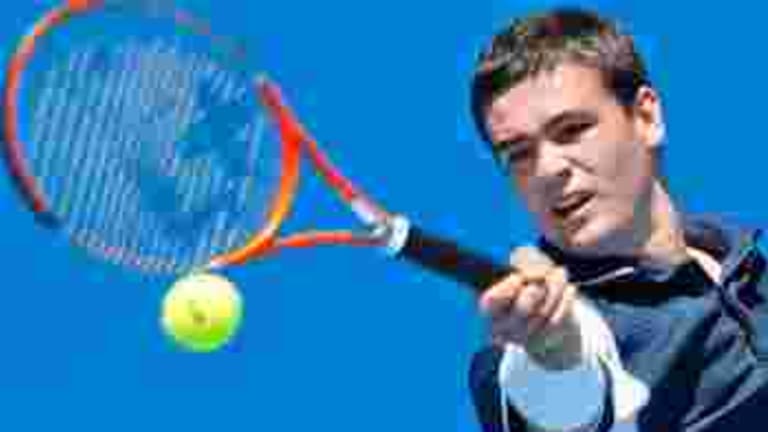MELBOURNE—The sound of kids screaming. That’s the first thing you hear as you approach the grounds on the Saturday before the Australian Open begins. This is a day devoted to the young. There are games to play and exhibitions to watch and oversize novelty tennis balls to bounce off your little brother’s head. It seems like a hit with parents who are looking for something that will occupy their rugrats for an afternoon. Most parents, that is. On the way in I overheard a conversation between a couple, one of whom was pushing a child in a stroller.
“How much was that hot dog?”
“Five seventy.”
“That’s insane.”
For the players, it's a day that makes the class distinctions on tour very clear. The stars spend it following one another in and out of the main interview room. Djokovic, Serena, Federer, Sharapova, Azarenka, and Murray were, for the most part, relaxed and chatty. They know the drill by now, the pressure of their matches is still a couple of days off, and, as Federer admits, after a month and a half away, he hasn’t been forced to talk to many people in the media lately. That will really make a player happy.
Djokovic jokes about liking Belgian beer, while Sharapova says that she looks forward to this tournament because, after six weeks off the road, “You’re officially bored of training and of life." She promises that she’ll give some Sugarpova to the reporter who asks the best question. At the end of the presser, though, she claims that no one qualified.
Serena, asked if she sees any similarity between her career and Andre Agassi's, admits that she does. “I was playing fabulous a decade ago," she says, “as he was.” A little later, Federer, leaning forward immaculately, makes me think of Warren Zevon’s Werewolf of London: “His hair was perfect.”
The one player who sounds uptight, understandably, is beleaguered Aussie Sam Stosur. “The results so far [this season] obviously haven’t been favorable,” she admits, with characteristic stoical understatement, about her early losses in January.
Out on the courts, the players in action are more Stosur than Djoker—grim and determined and hoping against hope, as well as past experience, for the best. It’s the final day of qualifying for a trip. While the press and the kids mostly ignore these journey men and women, this is their win-or-go-home time, their death or glory time.
What do those clichés look like in practice? The shots hit today are a little more careful and labored than normal, and the players quicker to show frustration. Survival, not style, is paramount. Among the game’s stars, when a match ends you might see winner and loser embrace. There’s none of that in evidence this afternoon. The divide between Roger Federer and Juan Martin del Potro, two famous athletes who are set for life, is narrower than the divide between Grand Slam qualifier and Grand Slam wannabe.
The upside for today's wannabes, though, is that the gap is rarely permanent. After a few years, what you notice more than anything about the qualies is their Groundhog Day effect. You see precious few future stars in these matches. For the most part, it’s the same struggling characters who reappear Slam after Slam, year after year, their fortunes wavering haphazardly between triumph and heartbreak.
At last year’s Aussie Open, I watched Portugal’s Michelle Larcher de Brito lose a crushing three-setter in her final qualifying match. She was in tears afterward. Today I watched her in the same round, on what I think was the same court, sneak through to the main draw 8-6 in the third set. She celebrated with a scream. At the U.S. Open in August, I watched American Tim Smyczek, in front of a huge evening crowd, beat Ricardis Berankis to make the big show. Today it was Smyczek’s turn to lose, while Berankis, on another court, won easily. (In one final twist of the tennis fates, though, Smyczek made it in anyway as a lucky loser, when countryman John Isner pulled out.)
As for Berankis, he didn’t appear particularly thrilled about being in this position again. Two years ago, after seeing the Lithuanian reach the third round here, I included him in a round-up of promising young male players, alongside Grigor Dimitrov, Milos Raonic, and Alexandr Dolgopolov. Those three have obviously progressed since, while Berankis has been plagued by back and groin problems and is currently ranked No. 111. Today, after missing a shot in an easy victory over Chile’s Paul Capdeville, Berankis shrugged, as if the pointless error was just prolonging his inevitable progression to bigger things next week.
Even if these players don’t make it any farther than the first round, even if they’re only fighting for the chance to be cannon fodder for a seed, many of them get to feel like stars for a day, especially here in the home of the raucous international sports fan. Berankis was serenaded by four people with Lithuanian flags; in response Capdeville’s much larger crowd of Chilean faithful escalated their own chants. By the end, of course, they had nothing left to cheer for, and most of them spent the last few games poking at their phones and staring blankly at nothing, as their country’s flag drooped behind them, unattended and unwaved. Still, pride is pride, and before the last point they roused themselves for a final, defiant, “Chi-chi-chi! Lay-lay-lay!” Capdeville thanked them with a thin grim smile.
The biggest star-for-a-day, though, was Great Britain’s Jamie Baker, who knocked off Donald Young in three sets to qualify. Five years ago, the Scot was diagnosed with a potentially fatal blood disease, and he celebrated this win by dropping his racquet and roaring as if he had won Wimbledon. This was the best attended, and perhaps the best played, of the matches today, and Baker had his own cheering section. To the tune of “Winter Wonderland,” a group of young rowdies at the top of the stands sang:

